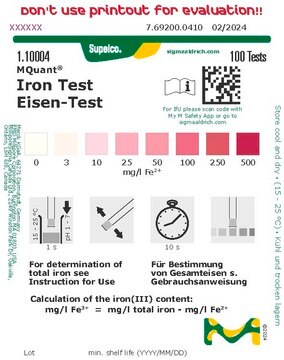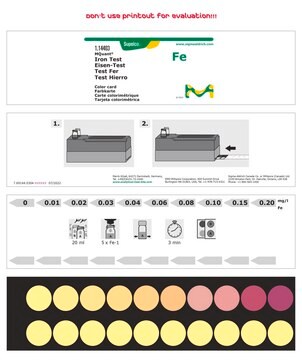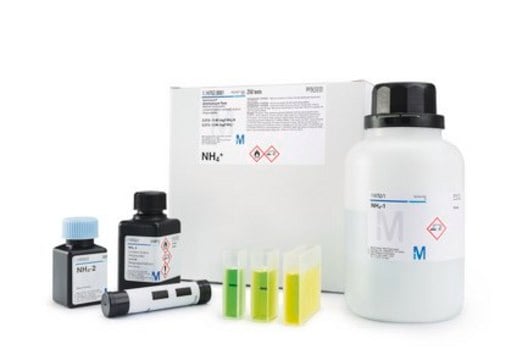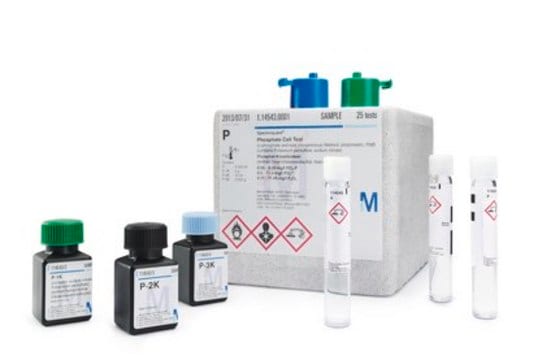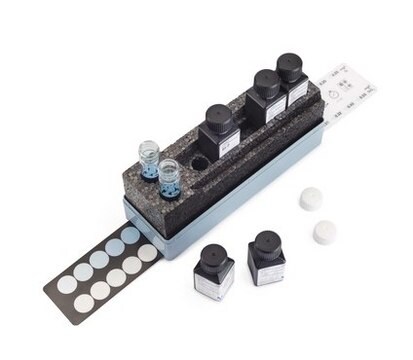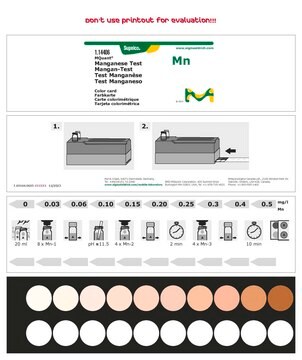1.11136
Iron Test
colorimetric, 0.1-50 mg/L (Fe), for use with MCOLORTEST®
Sign Into View Organizational & Contract Pricing
All Photos(1)
About This Item
UNSPSC Code:
41116116
Recommended Products
specific analyte(s)
iron
Quality Level
measuring range
0.1-50 mg/L (Fe)
compatibility
for use with MCOLORTEST®
detection method
colorimetric
storage temp.
15-25°C
General description
Method: colorimetric with color-matching vessel 0.1 - 0.3 - 0.5 - 1.0 - 2.5 - 5.0 - 7.5 - 12.5 - 25 - 50 mg/l Fe MQuant®
The MQuant® Iron test (formally MColortest®) measures bivalent and trivalent iron in its dissolved form and also fresh colloidal e.g. in
We also recommend this as a pretest for the oxygen determination with MQuant® Oxygen 1.11107 to check for iron interferences in the sample.
This test evaluates the color reaction based on the transmitted light method. So even turbid and colored water samples can be analyzed without further preparation. The color matching vessel is made of very durable, lightfast plastic, thus suitable for industrial areas and wet environments.
Method
All iron ions are reduced to iron(II) ions by hydroxylammonium chloride. In a buffered medium these react with 2,2′-bipyridine to form a red complex. The iron concentration is measured semiquantitatively by visual comparison of the color of the measurement solution with the color zones of a color matching vessel.
Without the addition of hydroxylammonium chloride (reagent Fe-1), the test measures only iron(II). so a differentialtion is possible.
Using the refill pack 1.08023 containing all the reagents, the original test kit can be used for a very long time, making this a particularly economical and ecological system.
- Groundwater and surface water
- Waters from aquaculture
- Drinking water and mineral water
- Industrial water
- Wastewater and percolating water
- Boiler and boiler feed water, cooling water
- Food (e. g. wine) after appropriate sample pretreatment
We also recommend this as a pretest for the oxygen determination with MQuant® Oxygen 1.11107 to check for iron interferences in the sample.
This test evaluates the color reaction based on the transmitted light method. So even turbid and colored water samples can be analyzed without further preparation. The color matching vessel is made of very durable, lightfast plastic, thus suitable for industrial areas and wet environments.
Method
All iron ions are reduced to iron(II) ions by hydroxylammonium chloride. In a buffered medium these react with 2,2′-bipyridine to form a red complex. The iron concentration is measured semiquantitatively by visual comparison of the color of the measurement solution with the color zones of a color matching vessel.
Without the addition of hydroxylammonium chloride (reagent Fe-1), the test measures only iron(II). so a differentialtion is possible.
Using the refill pack 1.08023 containing all the reagents, the original test kit can be used for a very long time, making this a particularly economical and ecological system.
The test measures bivalent and trivalent iron in its dissolved form and also fresh colloidal iron(III)hydroxide in e.g. groundwater and surface water, drinking water, industrial water and wastewater, whereas a differentiation between iron(II) and iron(III) is possible.
Legal Information
MCOLORTEST is a registered trademark of Merck KGaA, Darmstadt, Germany
MQUANT is a registered trademark of Merck KGaA, Darmstadt, Germany
Signal Word
Warning
Hazard Statements
Precautionary Statements
Hazard Classifications
Aquatic Chronic 3 - Carc. 2 - Eye Irrit. 2 - Met. Corr. 1 - Skin Irrit. 2 - Skin Sens. 1
Storage Class Code
8B - Non-combustible, corrosive hazardous materials
WGK
WGK 3
Flash Point(F)
Not applicable
Flash Point(C)
Not applicable
Certificates of Analysis (COA)
Search for Certificates of Analysis (COA) by entering the products Lot/Batch Number. Lot and Batch Numbers can be found on a product’s label following the words ‘Lot’ or ‘Batch’.
Already Own This Product?
Find documentation for the products that you have recently purchased in the Document Library.
Our team of scientists has experience in all areas of research including Life Science, Material Science, Chemical Synthesis, Chromatography, Analytical and many others.
Contact Technical Service